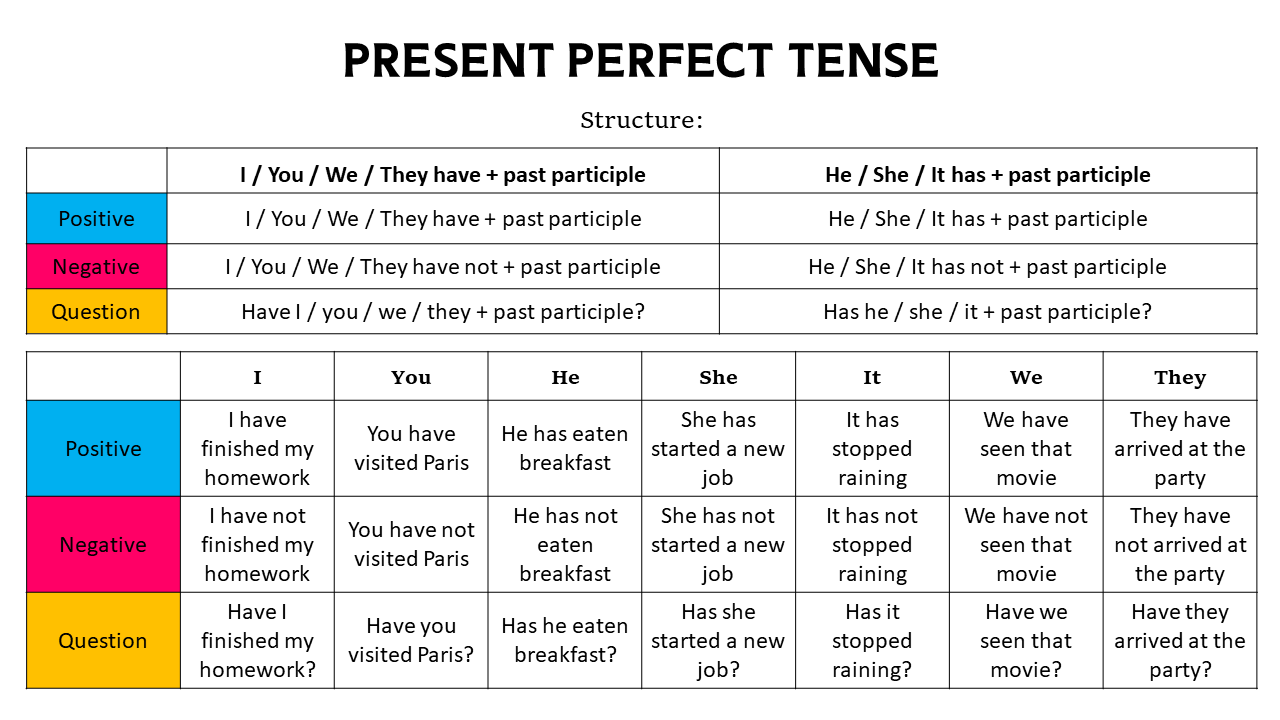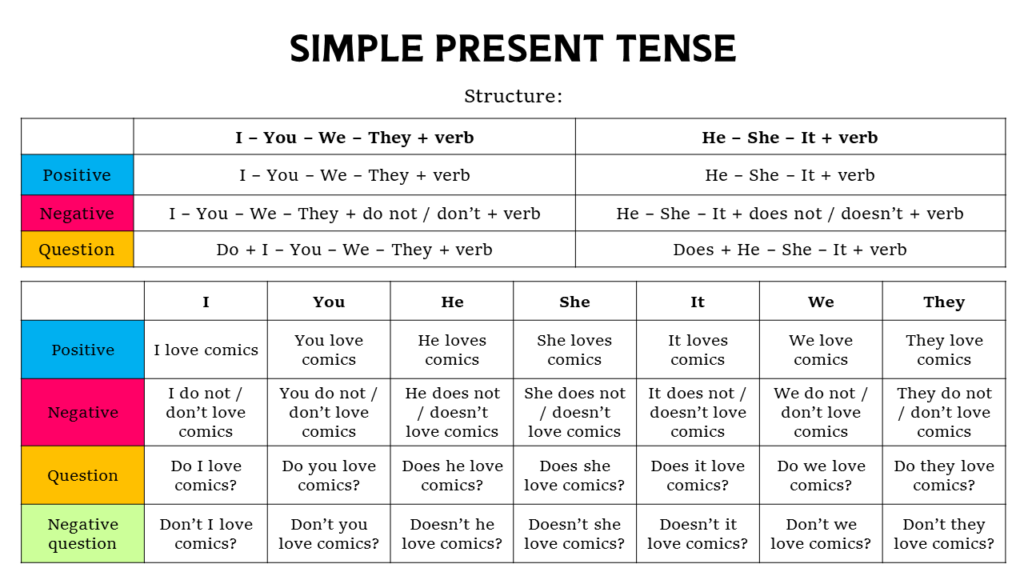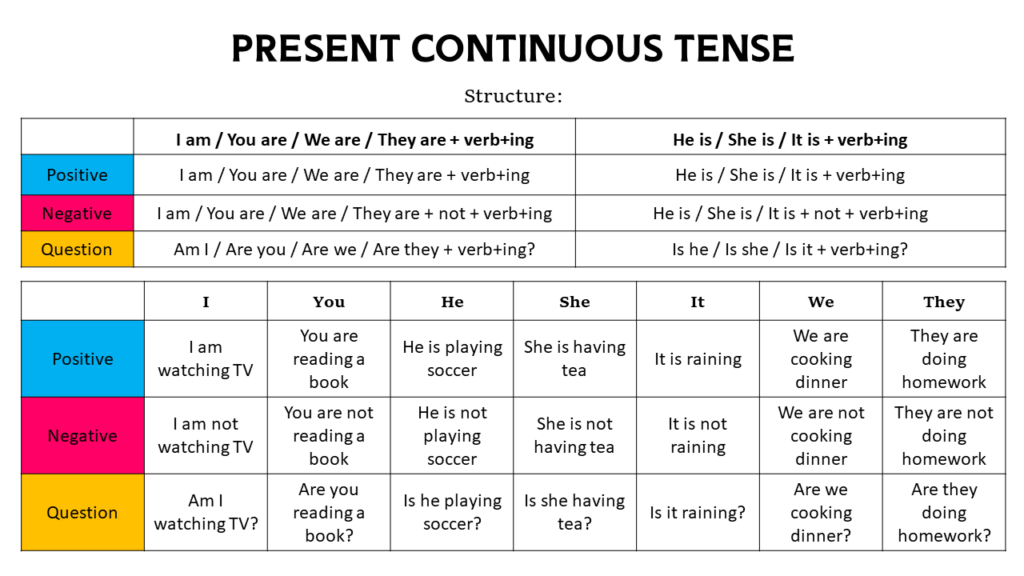Understanding the present perfect tense is crucial for conveying actions that have occurred at an unspecified time before now. The emphasis is on the result rather than the moment of action, bridging the past with the present in a unique way.
Definition
The present perfect tense is used to describe actions completed at an unspecified time before now, emphasizing the outcome over the precise moment of action. It’s a blend of past actions influencing the present.
Formula/Structure
The present perfect tense is formed using the auxiliary verb “have” (or “has” for third-person singular) followed by the past participle of the main verb. Here’s the breakdown:
- Affirmative: Subject + have/has + past participle
- Example: “They have finished their work.”
- Negative: Subject + have/has + not + past participle
- Example: “She has not visited Paris.”
- Interrogative: Have/Has + subject + past participle?
- Example: “Have you seen this movie?”
Rules with Examples
- Regular verbs form the past participle with an -ed ending: “I have walked to school.”
- Irregular verbs have unique past participle forms: “She has eaten lunch.”
- Use ‘has’ for third-person singular subjects (he, she, it): “He has arrived.”
How to Make Present Perfect Tense
1. Positive Present Perfect Tense
Combine “have” or “has” with the past participle of the verb to describe an action that has been completed.
2. Negative Present Perfect Tense
Add “not” after “have” or “has” to negate the statement.
3. Interrogative Present Perfect Tense
Start with “have” or “has,” then add the subject and the past participle to form a question.
Examples of Present Perfect Tense
Examples of Positive Present Perfect Tense
- “I have traveled to three countries.”
- “You have learned a lot.”
- “He has written a novel.”
- “She has made a cake.”
- “It has rained today.”
- “We have been to the new museum.”
- “They have played soccer.”
- “The movie has started.”
- “The birds have flown south.”
- “Our friends have bought a new house.”
Examples of Negative Present Perfect Tense
- “I haven’t finished my homework.”
- “You haven’t seen the latest episode.”
- “He hasn’t called me back.”
- “She hasn’t tried sushi.”
- “It hasn’t stopped raining.”
- “We haven’t decided yet.”
- “They haven’t met him.”
- “The train hasn’t arrived.”
- “The dog hasn’t eaten its food.”
- “The guests haven’t left.”
Examples of Interrogative Present Perfect Tense
- “Have you ever been to Africa?”
- “Has he finished his project?”
- “Have they heard the news?”
- “Has she visited the new cafe?”
- “Have we met before?”
- “Has it ever snowed in April here?”
- “Have you read this book?”
- “Has the mail arrived yet?”
- “Have the children eaten their lunch?”
- “Has the movie ended?”

Exercise of Present Perfect Tense With Answers
Questions
- I (to finish) my report.
- She (not to call) us yet.
- (you to see) the latest movie?
- He (to travel) around Asia.
- We (not to decide) on the venue.
- (they to arrive) at the airport?
- The plants (to grow) a lot.
- She (not to try) Thai food before.
- (it to rain) in your city recently?
- They (to complete) the marathon.
Answers
- I have finished my report.
- She hasn’t called us yet.
- Have you seen the latest movie?
- He has traveled around Asia.
- We haven’t decided on the venue.
- Have they arrived at the airport?
- The plants have grown a lot.
- She hasn’t tried Thai food before.
- Has it rained in your city recently?
- They have completed the marathon.
The present perfect tense is a powerful tool in English, enabling speakers and writers to link past actions with the present. Understanding its formation, rules, and applications can significantly enhance your grammatical skills and communication effectiveness.


